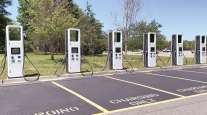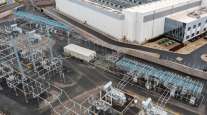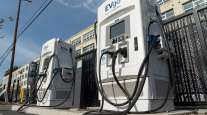Staff Reporter
Madison Debuts Wisconsin’s First Electric Garbage Trucks
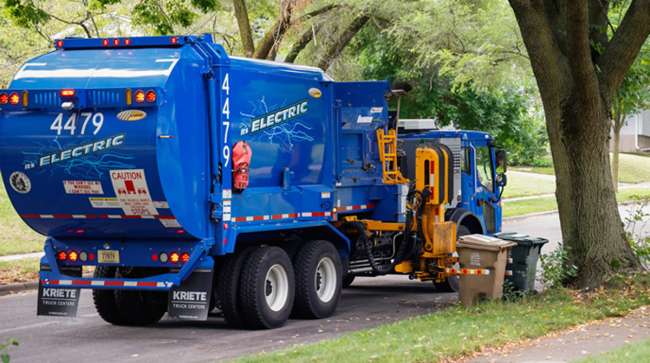
[Stay on top of transportation news: Get TTNews in your inbox.]
MADISON, Wis. — Wisconsin’s capital city has introduced its first electric garbage trucks, marking the state’s first deployment of fully electric Class 8 refuse tractors. Madison received the two Mack LR Electric vehicles in a ceremony Sept. 17.
“Electrifying heavy-duty vehicles is on the forefront of zero-emissions technology,” Madison Mayor Satya Rhodes-Conway said during the ceremony. “Madison will help demonstrate the performance of these new electric garbage trucks in real-world conditions and help quantify the long-term savings associated with eliminating fossil fuel costs and reducing maintenance expenses.”
She noted the city now operates more than 100 fully electric vehicles and 150 hybrids, while its transit system has added 62 new electric buses.
Mack Trucks North America partnered with Milwaukee-based Kriete Truck Centers to provide the city with two zero-tailpipe-emissions trucks: a Mack LR Electric with a Leach rear loader and a Mack LR Electric with a Labrie automated side loader. The price tag was not disclosed, but the mayor said the trucks were paid for with capital funds to save on future operating costs.
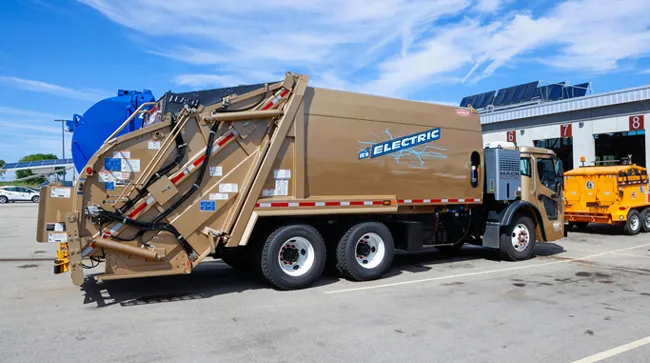
Madison's Mack LR Electric with a Leach rear loader. (City of Madison)
She thanked the leadership at Mack Trucks and Kriete for having the foresight to make corporate investments in EVs, such as the electric garbage trucks that will journey along every block within the city to improve the lives of residents with less noise and emissions than traditional refuse vehicles.
Jonathan Randall, Mack Trucks North America president, congratulated the city for its historic step to lower greenhouse gas emissions in vehicles that also provide quieter handling of municipal refuse and recycling.
Bryan Johnson, city streets division recycling coordinator, said the rear-loader electric truck has been fitted for leaf collection.
RELATED: Mack Unveils LR Electric Model for New York City Department of Sanitation
Owen Buske, a city of Madison employee who has been driving the electric refuse trucks recently put into service, has had to adjust to driving in a “very quiet” cab in which he no longer hears the vehicle rumble over every bump on the road.
He told of city residents reacting with surprise when seeing him pass by behind the wheel of the electric garbage trucks emblazoned on the sides with “It’s ELECTRIC” wording surrounded by lightning bolt graphics.
“People look at the vehicle when it goes by and then take a second look,” Buske described. “Sometimes they give a thumbs-up as I drive by.”
The city of Madison, which already sources nearly 75% of its electricity from renewable sources, has set an ambitious goal: to power all municipal operations with 100% renewable energy by the end of the decade.
David Kriete, president and CEO of Kriete Truck Centers, said his company has made “significant financial investments” in its drive to increase EV capabilities with new EV certifications that include specialized training for technicians and sales staff. Infrastructure has also been modified for EV charging. It already has received orders for two medium-duty electric trucks.
RELATED: Excitement Builds for Mack's Medium-Duty Electric Truck
“Our job is to provide customers with transportation solutions that help them achieve their goals,” Kriete said. “The City of Madison is committed to being good stewards of the environment, and we’re grateful for the opportunity to be part of their journey.”
The Mack EV truck ceremony was held at Kriete Truck Centers in Madison, one of the family-owned company’s 10 locations in the state that sell, lease and rent trucks as well as provide services and parts.
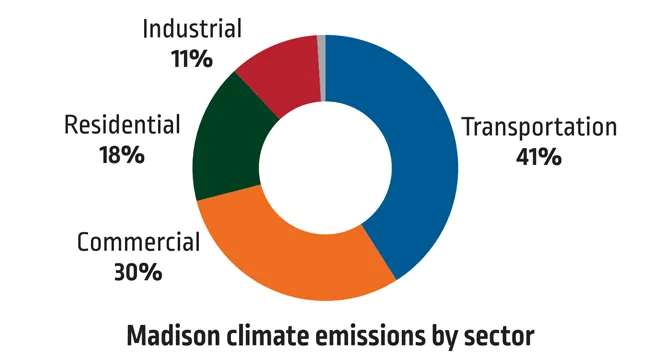
(City of Madison)
Adam Gaines, general manager at Kriete Truck Centers in Madison, Mauston and La Crosse, described how he can easily monitor electricity levels in the EV trucks through chargers from ChargePoint. Kriete has established charging stations for its vehicles and those owned by its customers.
RELATED: Mack Offers Range Calculator for LR Electric Model
“Through ChargePoint, I am able to monitor trucks on a charger and set them up by vehicle identification number to allow them to charge. [The system] will maintain the history by customer and truck to show how much electricity they have used,” Gaines said. “Today our charger is set up for our customers only, but in the future we can open it up to the public and be able to charge a fee to cover the cost of electricity.”
He said the EV charging stations, mounted on a skid system for easy mobility, can be moved to different locations at Kriete in Madison either within or outside its gate for public use. Pennsylvania-based EnTech provided the skid system and installation assistance for the high-tech operations.
TT's Seth Clevenger and Mike Senatore dive into the details behind the 2024 Top 100 Private Carriers list. Tune in above or by going to RoadSigns.ttnews.com.
The electric garbage trucks and their batteries are supported by integrated telematics through Mack GuardDog Connect to help users achieve peak operating conditions and maximize uptime. The connected service monitors battery health and performance, while also checking for fault codes and defects reported by the energy storage system’s battery and electric components.
George Fotopoulos, vice president of E-Mobility at Mack Trucks, thanked the city for partnering with Mack Trucks and “trusting us in your electric vehicle journeys. The introduction of these electric vehicles is not just about replacing old trucks with new trucks. It’s embarking on a new era of waste management.”
Copper-colored Mack Bulldog hood ornaments set these electric refuse trucks apart, symbolizing their zero-emission status. The vehicles employ advanced technology, including a two-stage regenerative braking system that recaptures energy during hundreds of daily stops, even as loads grow heavier.
“These vehicles offer real-world benefits,” Fotopoulos said. “They’re more efficient, they’re quieter, they’re safer, and they have lower emissions, which means they’re also healthier for the communities that they serve. The future of transportation and waste is actually here today with these two vehicles behind us.”
Want more news? Listen to today's daily briefing below or go here for more info:



